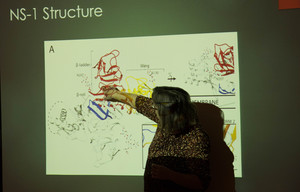Senior biology students study the Zika virus

CHADRON – On a Friday morning in late March, Chadron State College students enrolled in BIOL 456 Pathogenic Microbiology gathered in study groups around laptops to discuss their research into the origin, transmittal, life cycle and man-made events that may be contributing to the spread of the Zika virus.
The students were wrapping up a two-week module that started with questions they generated based on what they had heard about Zika, a virus transmitted by mosquitoes and currently an epidemic in Brazil.
A person infected with the virus may not exhibit symptoms so scientists are concerned about the spread of the virus from pregnant mothers to their babies, possibly causing microcephaly, decreased infant brain and head size, as well as possible transmission between adults via sexual contact.
Dr. Ann Buchmann, professor of physical and life sciences, has included in-depth discussions and research of diseases such as influenza and E. coli in the course which is taught each spring.
“One of the interesting things about having a course based on infectious diseases is the opportunity to look at new and emerging diseases as epidemics unfold,” she said.
Many questions remain unanswered such as the lifespan of the virus in the host and other possible transmission methods, Buchmann said.
The class studied how the virus has changed and timelines showing how and where it spread from Africa, as well as a hypothesis that the 2014 World Cup in Brazil increased the spread and speed of infection in multiple countries, Buchmann said.
Brent Bussinger of Kimball, Nebraska, said one of the biggest concerns the class discussed is the possible implications of having the summer 2016 Olympics in Brazil while it is experiencing an outbreak of Zika.
Student groups compared research from various countries to Brazil since it has the most data from adult and fetal tissue analyzed and recorded.
“We talked a bit about other flaviviruses such as dengue and West Nile plus other up and coming mosquito-borne viruses such as chikungunya,” Buchmann said. “We also briefly talked about other viruses that can cause problems in pregnancy such as cytomegalovirus and rubella. The students were interested in the topic and I was impressed that they worked hard to find and understand resources. This is a really committed group of students who are interested in science and health care, and I think the topic resonated with most of them.”
During her lecture, Buchmann invited her colleague, Dr. Mathew Brust, a leading Nebraska entomologist, to speak about the mosquitoes capable of carrying the Zika virus.
For the next unit, Buchmann’s class will study Ebola and incorporate some of what was learned over the last year about the treatment for the disease.
Category: Campus News, Physical and Life Sciences

